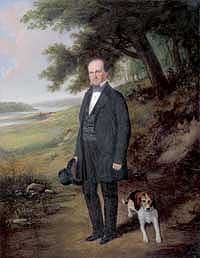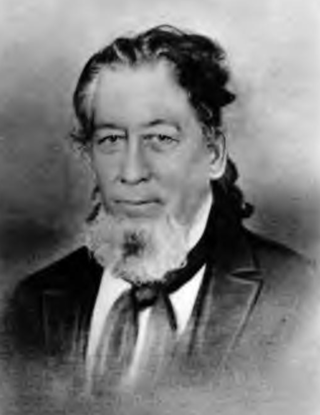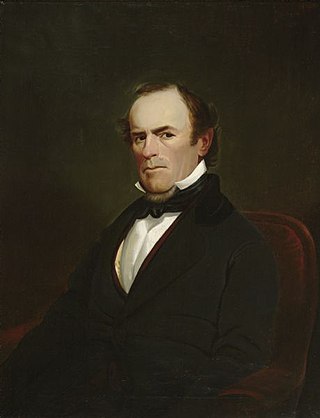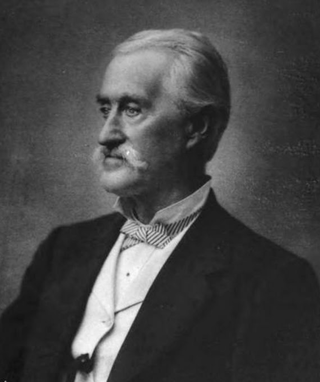Related Research Articles

George Wallace Jones was an American frontiersman, entrepreneur, attorney, and judge, was among the first two United States Senators to represent the state of Iowa after it was admitted to the Union in 1846. A Democrat who was elected before the birth of the Republican Party, Jones served over ten years in the Senate, from December 7, 1848 to March 3, 1859. During the American Civil War, he was arrested by Federal authorities and briefly jailed on suspicion of having pro-Confederate sympathies.

Morgan Lewis Martin was a delegate to the United States House of Representatives from Wisconsin Territory during the 29th United States Congress (1845–1847). He also served as a member of the Wisconsin State Senate and Wisconsin State Assembly, and served as a county judge in Brown County, Wisconsin.

William Rudolph Smith was an American lawyer, politician, pioneer, and historian from Pennsylvania who served as the 5th Attorney General of Wisconsin, the first President of the Wisconsin Historical Society, and the first Adjutant General of Wisconsin.

Alexander Botkin was an American lawyer, politician, and pioneer settler of Dane County, Wisconsin. He served one term each as a member of the Wisconsin Senate and Wisconsin State Assembly.

Levi Sterling was an American farmer, politician, and Wisconsin pioneer. He was one of the first American settlers at what is now Iowa County, Wisconsin. He served five years in the Wisconsin Legislature and—before Wisconsin achieved statehood—he served three years in the Wisconsin Territorial Assembly. During the American Civil War, he served as a Union Army cavalry officer.
Peter Hill Engle was an American lawyer, judge, and Iowa pioneer. He served as the first Speaker of the Legislative Assembly of the Wisconsin Territory after it was established, when it still contained the territory of the future states of Iowa and Minnesota. He later served as a judge of the St. Louis County, Missouri, Court of Common Pleas from 1841 until his death.

Edward Dwight Holton was a nineteenth century Wisconsin political and business leader. Holton was Milwaukee's first sheriff and was a member of the Wisconsin State Assembly, but despite never holding a higher office he was influential in the early political development of the state. He was a candidate in the pivotal 1857 gubernatorial campaign, and was well known as an important leader on the subjects of abolitionism and temperance. He also had a strong influence on the development of the state through his involvement in the banking, railroad and insurance businesses.

David Noggle was an American politician, lawyer, and jurist. He was chief justice of the Supreme Courtof the Idaho Territory from 1869 to 1875, appointed by President Ulysses S. Grant. Earlier, he served as a member of the Wisconsin State Assembly and a Wisconsin circuit court judge.
Armstead, Armisted, Armistead C. or A. C. Brown was an American farmer, miner and lawyer from Wisconsin and later California, who served a single term in the 1st Wisconsin Legislature as a Whig member of the Wisconsin State Assembly. He then moved to California as a Forty-Niner, where he became one of the founding fathers of Amador County, becoming a merchant, judge and legislator in Jackson, California.

The 1849 Wisconsin gubernatorial election was held on November 6, 1849. Democrat Nelson Dewey won the election with 52% of the vote, winning his second term as Governor of Wisconsin. Dewey defeated Whig Party candidate Alexander L. Collins and Free Soil Party candidate Warren Chase.

Alexander Lynn Collins was an American lawyer, judge, and politician. He was an important leader of the Whig Party in the early years of Wisconsin, serving as party chairman, nominee for United States Congress, for United States Senate, and for Governor of Wisconsin. He also served as a Wisconsin Circuit Court Judge and a member of the University of Wisconsin Board of Regents. In historical documents, his middle name is sometimes spelled "Linn" and he is sometimes referred to as "A. L. Collins."
Jarvis K. Pike was an American attorney, judge and politician who served in local offices, and in the state legislatures, first in New York (state) and then in Cold Spring, Wisconsin.
Robert Marshall Briggs was an American merchant, lawyer, judge and politician in Wisconsin and California. Briggs served as a Whig member of the 2nd and 4th Wisconsin Legislatures representing Grant County in the Wisconsin State Assembly; and in 1857 was elected to the California State Assembly from Amador County as a Know-Nothing. He also served as a district attorney and a judge.
Peter Turck often misspelled Turek was a farmer from Mequon, Wisconsin who served a single one-year term as a member of the Wisconsin State Assembly.
Jabez Pierce or Peirce was a carpenter and miner from Mineral Point, Wisconsin who served a single one-year term as a Democratic member of the Wisconsin State Assembly for 1849.
Davis Gillilan or Gillilian was an American merchant, miner and politician from Dubuque, Wisconsin Territory and Potosi, Wisconsin, who held various elected offices in Dubuque and served a single one-year term as a Democratic member of the Wisconsin State Assembly from Grant County.
The First Legislative Assembly of the Wisconsin Territory convened from October 25, 1836, to December 9, 1836, and from November 6, 1837, to January 20, 1838, in regular session. The Assembly also convened in special session from June 11, 1838, to June 25, 1838.
William Shew was a farmer and businessman from Oak Creek, Wisconsin and Cordova, Illinois who served multiple terms in the Wisconsin Territory House of Representatives representing Milwaukee County, and was Speaker of the House of that body during the first (1847) session of the 5th Wisconsin Territorial Assembly, as well as holding various local government posts.
James Pitman or Pittman Cox was a tanner, farmer, sheriff and judge from Grant County, Wisconsin.
Thomas Shanley was a pioneer settler from Lancaster, Wisconsin who served as a member of the 1st Wisconsin Territorial Legislature.
References
- ↑ "The Pioneer Legislators", Strong, Moses M., Grant County Witness June 14, 1877; p. 2, col. 4] via Newspapers.com
- ↑ "Territorial Whig Convention", South Port American August 2, 1845; p. 1, col. 2 via Newspapers.com
- ↑ "Vote for Delegate", Mineral Point Democrat November 25, 1845; p. 2, col. 4 via Newspapers.com
- ↑ Reid, Harvey. "Colonel Thomas Cox" The Annals of Iowa Volume 7 Number 4 (1906). Des Moines: State Historical Society of Iowa, 1906. pp. 261-262 and passim